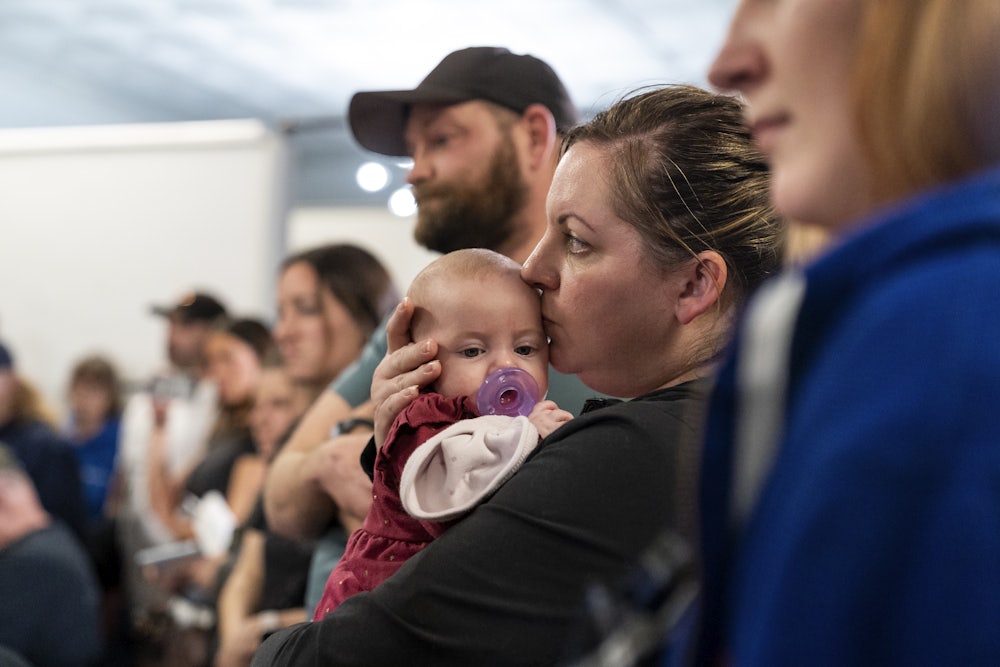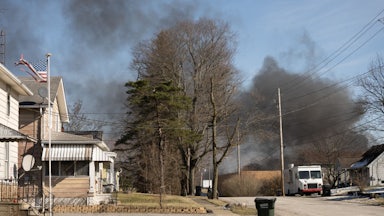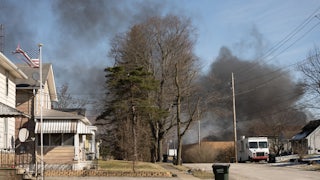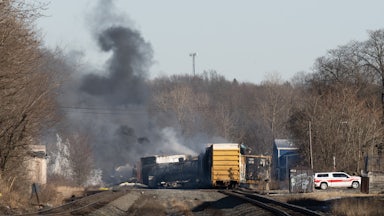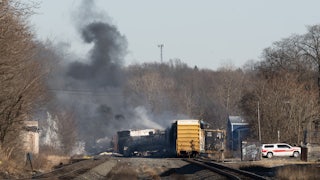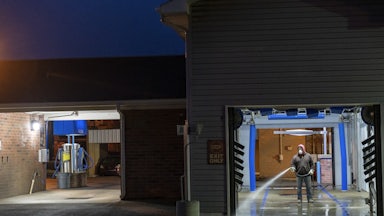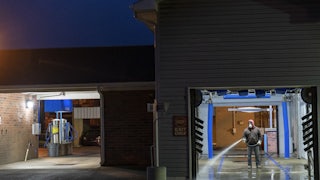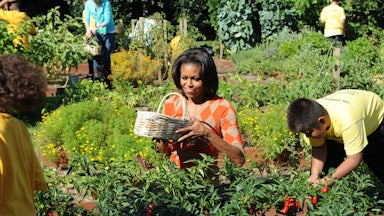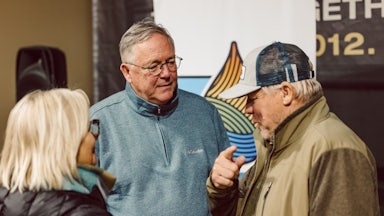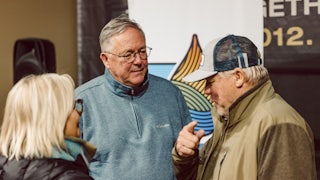Every four years when I was growing up, my mother would scoff at the influx of presidential nominees pretending to care about Ohio voters. Now the town of East Palestine is being subjected to that spectacle in an off year.
Long before the 150-car train carrying hazardous chemicals derailed in East Palestine, the entire surrounding region was suffering from indifference and tepid neglect. And even after the “controlled explosion”—meant to avert a more catastrophic spill—spewed black chemical smoke over the modest homes in this neighborhood, the disaster was widely overlooked until it became popular to self-righteously accuse one’s political opponents of ignoring the disaster. Peak disaster posturing probably occurred last week, when former President Donald Trump showed up (weeks after the crash) for a publicity stunt to hand out water bottles branded with his own name—along with bottles of “much lesser quality water,” he added. The verbal tic—meant to elevate Trump water—came across as particularly insensitive in a place where toxic chemicals have upended lives and residents had been depending upon daily water quality monitoring for safety.
At an early public meeting, East Palestine residents asked why contaminated soil was not being removed—important to keeping toxins from leaching into the groundwater. Officials assured them that returning home was safe, despite the vinyl chloride in the train’s cargo having been linked to liver, brain, lung, and blood cancers. But if it’s safe in town, residents wanted to know, why does it hurt to breathe?
I grew up about a half-hour north of East Palestine, in a town about twice its tiny size, in a wash of small cities that rose with industry in the belt between Pittsburgh and Cleveland. By the time I was born, the Mahoning Valley’s steel industry had moved offshore. Brownfields dotted our landscape; train whistles remained ubiquitous as cars chugged along old lines, onward to elsewhere.
Elsewhere was my mother’s great dream for me. Keep up my grades, get a college scholarship. Get out. It wasn’t just my mother. Unemployment was rampant in our region, and many of us felt a push to flee.
Certain candidates that swept through town during election season swore allegiance to union workers. I could count on one hand friends whose parents were fortunate enough to still have actual union jobs. Far more didn’t have jobs at all. I became part of a diaspora, a “brain drain” from our aging, shrinking communities.
Some stayed. I know some folks who dedicated their lives to trying to redevelop the area. Some get up each day, check books out to kids at the library, pack their kids onto school buses, trust they can carve out a life and grow a family in their little patch of America. That’s the dream, isn’t it? They sure don’t plan to live in a place awash in carcinogens.
Initially, Mary Mertz, the director of the
Ohio Department of Natural Resources, reported that the chemicals did flow into
about 7.5 miles of nearby water and killed roughly 3,500 fish. According to The
Vindicator, (which I delivered after school as a kid), Mertz said that
though some people say they’ve gotten sick, or their animals have died or been
ill due to the toxic chemicals from the derailment, her office has no evidence
of nonaquatic species dying as a result. Now the death count for aquatic
animals is 43,700.
Residents have reported
burning eyes, sore throats, and sick pets.
The Environmental Protection Agency has been monitoring air, water, and soil quality and has issued an order for Norfolk Southern to conduct and pay for all cleanup associated with the train derailment. Now that contaminated soil is being removed from the crash site, Youngstown’s WKBN-27 reported that the soil is being dumped right behind State Line Tavern, a business along the Ohio-Pennsylvania border.
It’s no wonder locals are questioning whether officials’ assurances of safety can be trusted. At a recent town hall, a resident noted that Governor Mike DeWine had only been to town a few hours at a time. Would he stay overnight? Would he stay near the crash site? DeWine said he would.
But I wonder how he’d sleep that one night compared to all the nights these families are supposed to grow accustomed to tucking in their kids, learning to trust the air and water again, when their trust has not been well earned. How does a one-night stay measure against making a home? Especially when so many people in these communities have already grown up hearing that home is a place we’d be better off leaving?
I can’t remember exactly when I first heard the term “Rust Belt.” I was probably in my twenties the first time I had the sense to hate it—likely around the time I’d moved to Washington, D.C., and was working at a nonprofit that advocated for green jobs for young people. I often received emails from my mother around that time reporting yet another earthquake back home. I’d sit at my desk, writing cheery copy about a young adult making their way in the world, making a difference thanks to learning an environmentally sustainable trade, and a message from my mother would pop through.
At first, it seemed like a fluke. Earthquakes in Ohio?
By the time the house-rattling booms topped a dozen, officials concluded that a fracking injection well had activated a fault line. I was agog and also, somehow, unsurprised all at once. It felt like the sort of ridiculous thing that would happen where I grew up. My mother told me about the cracks in the plaster in the walls of their house. There was nothing she thought they could do about the damage. Who had insurance to cover earthquakes? It was an injustice that would fade into the background with so many others.
Between big companies and government regulators, who could hope that anyone would be watching out for generationally low-income families? I offered to swap out a bit of drywall the next time we visited, but my little patches could never really cover all the cracks.
Many people I know whose mothers rushed them out of Northeast Ohio as if a college degree was a lifeboat eventually meandered back to one of Ohio’s three C’s (i.e., Cleveland, Columbus, Cincinnati) or drifted just over the state border to Pittsburgh. I live in Cincinnati now with my family, drawn here in part to be closer to help those who cleared me off. There’s a degree to which aging parents create their own tidal pull.
In the past few weeks, I’ve seen maps proliferate on social media of the possible spread of chemicals from the East Palestine train crash—hundreds of miles potentially awash in toxins, tributaries branching out to millions. (According to the Ohio River Foundation, over 25 million people, nearly 10 percent of the U.S. population, live in the Ohio River Basin.) Officials say they contained contaminants in the Sulpher Run near the site. Officials say they are tracking a contaminant plume traveling along the Ohio River, and treatment and water intake closures would occur downstream, to keep the chemicals out of local systems. Monitoring is happening across multiple states. Those on municipal water lines will have the benefit of removal methods, though. Rural well users and those subject to groundwater contamination in other parts of the state don’t have that. I wonder about the farms, the food.
At the center of these maps are the people who
never left. Further out lie the many children of Northeast Ohio’s exodus, the
economic evacuation. I read it like a sort of family tree drawn in waterways: all
of us, (and our pets, wildlife, and livestock) who deserve fresh, clean water,
not the devastation of environmental disaster.
Newsweek’s Darvio Morrow, a Clevelander, recently expressed righteous disgust over dismissive tweets he’d seen concerning some of these maps that have been getting tweeted, as if the disaster’s potential implications are fodder for jokes. One such Twitter user shrugged off the poisoning of what he called “Yokel Central” (Ohio, Pennsylvania, West Virginia, Indiana, Illinois, Kentucky, Tennessee, etc.), adding, “Gee, that’s too bad. Perhaps they’ll reevaluate their voting patterns. (They won’t.)”
“Elites don’t give a damn about Ohio,” Morrow concluded. My mother would have penned the same opinion piece decades ago, but never would have expected anyone to publish it.
I, too, am dead tired of this span of the country being treated like some other place, some dead place, some badland of Walmarts and Bubbas. Not only should the hungry kids here, the potentially poisoned kids, merit attention on their own terms, but the implications of this particular disaster—a story of underregulation and poor environmental disaster response—are clearly wider and vaster than one town’s hot spot. I don’t know why it took so long for the derailment to capture the attention of the American zeitgeist. Maybe decades of neglect just turns into a habit.
When the disaster finally began grabbing a swell of attention last week, it immediately became a rhetorical battering ram to hurl at partisan opponents. I see a screengrab of a Fortune article: It was Donald Trump who rolled back a rail braking rule meant to keep oil tankers from exploding near communities. (The rule would not have applied to the train that crashed.) Others focused their ire on the current administration: “Where’s [Secretary of Transportation] Pete Buttigieg?” one East Palestine resident (and then of course Fox News) wanted to know. President Biden is at fault for making it impossible for railroad workers to strike over unsafe conditions, one outlet argues. And the blame game continued on down the political food chain: Why was Representative Jim Jordan (often spelled “Gym” in these tweets—the moniker referencing accusations that he ignored sexual abuse while working as an assistant wrestling coach at Ohio State) more concerned about Hunter Biden’s laptop than the fate of his fellow Ohioans? Then there was Trump’s stunt with the water bottles, preempting Buttigieg’s planned visit by a day—and when the transportation secretary did arrive, he was promptly mocked for his “dress boots” and hard hat—with some tweets alluding to the Village People. So the whole thing landed where the internet often does: knee-deep in homophobia and a million miles from a productive policy discussion.
Certainly, there is a time for holding public officials accountable. But when the bulk of the national discourse seems wedged between “owning the libs,” blaming the “Repubs,” and “#msm failing to report on #OhioChernobyl,” it’s clear that care has been discarded in favor of outrage and posturing. It’s like watching a group of people with the resources and ability to save a life standing over a dying person, bickering over whose fault it is that they are sick. There’s violence in each moment wasted in distraction instead of aid. Surely, this level of callous inertia is only possible if the life (or in this case lives) you are bickering over do not feel remotely like kin.
As our climate changes, I wonder, what will we do? Progressively abandon people to each economically and environmentally blighted region, as if we share no relation to them? As if a disaster for people deemed unworthy of intimate care won’t eventually lap onto our shores, our own water supplies? Perhaps, briefly, play-act concern for the cameras until attention fades. It always fades.
I wish more people could find it in themselves to give a damn for the catastrophes befalling people in forgotten places. But so many of us still have the luxury, with our clean air and water, our safety, our lack of proximity, of abstracting disaster into polemic instead. It spares our imagination. We can still claim distance from the great cloud of smoke, the chemical plume, the people—not our people—suffering who knows what comes next.
